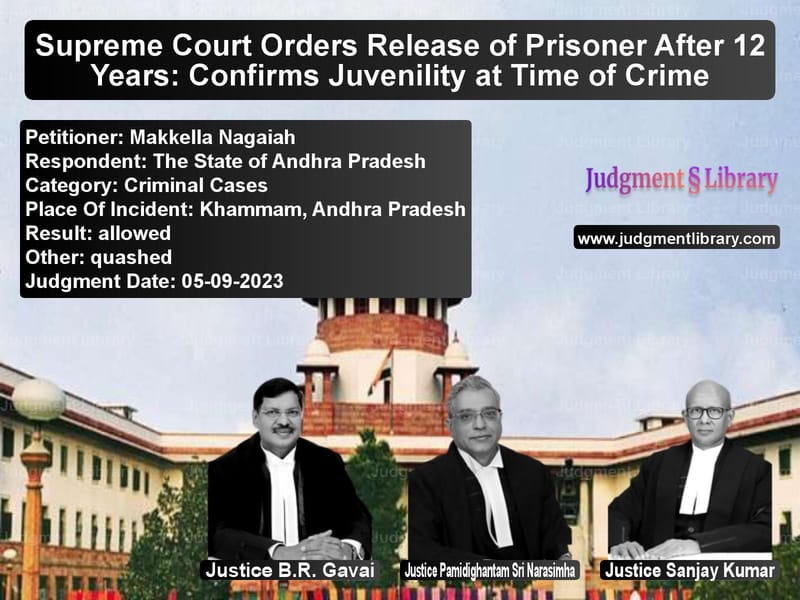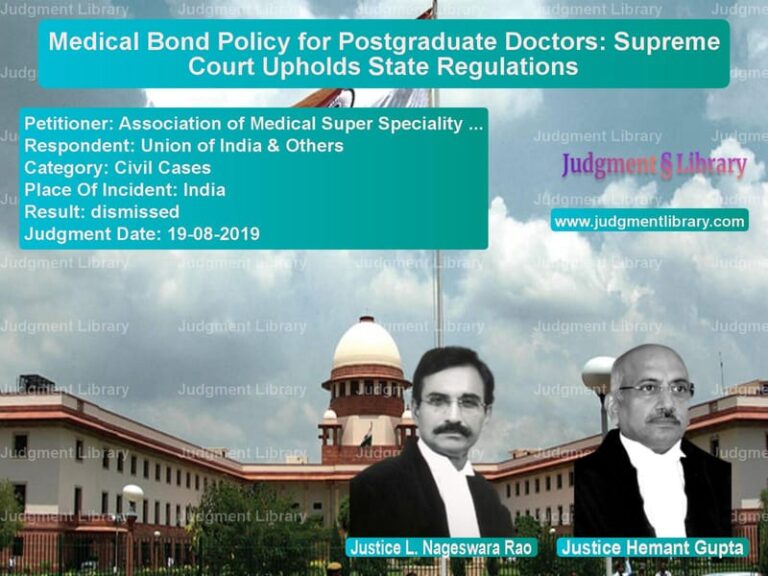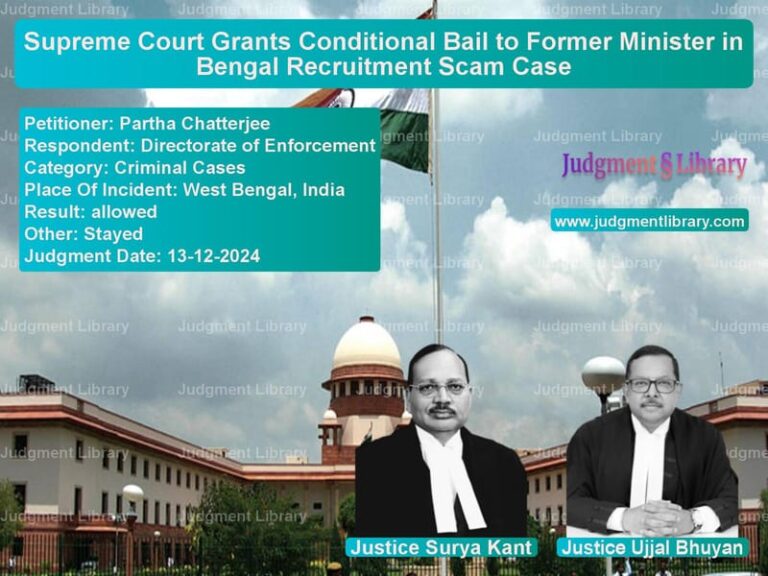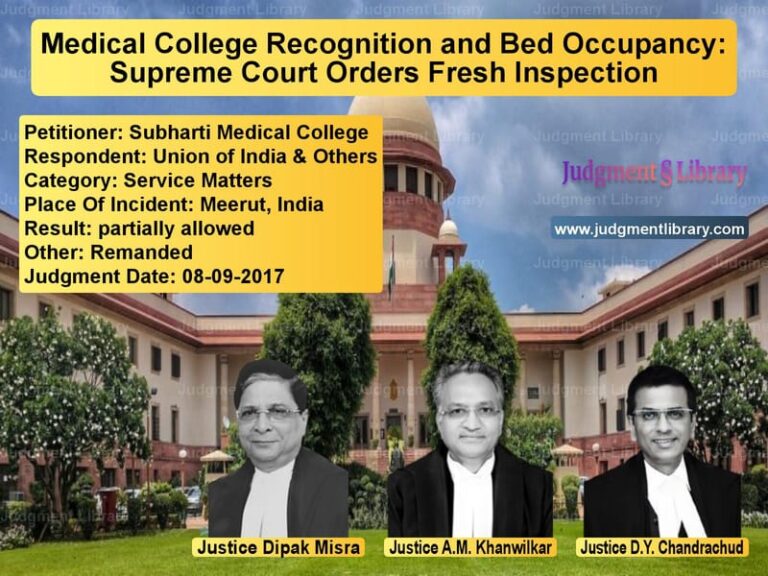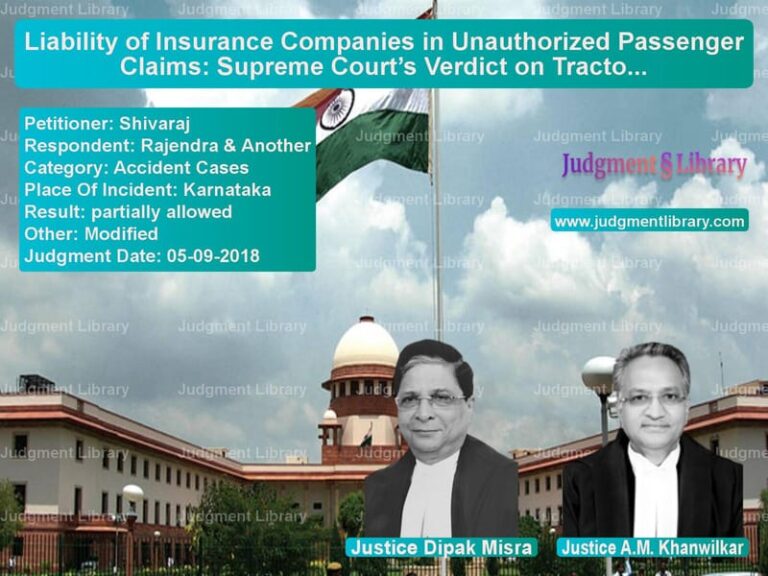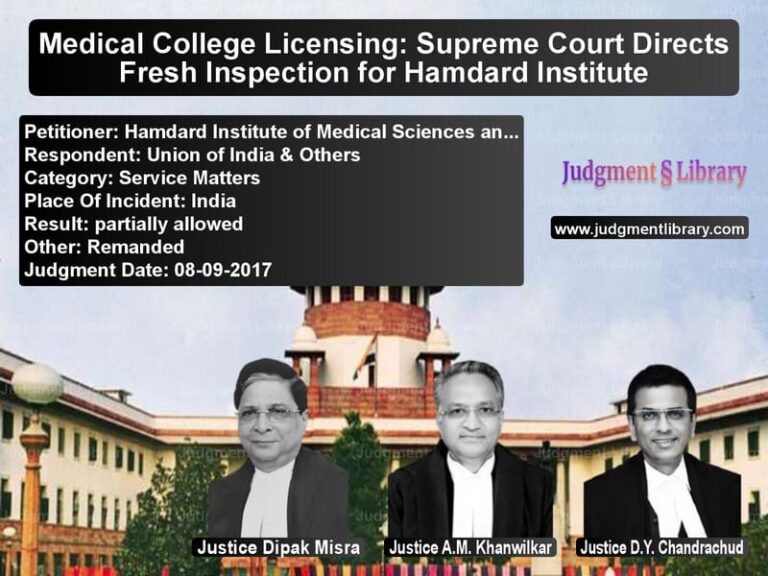Supreme Court Orders Release of Prisoner After 12 Years: Confirms Juvenility at Time of Crime
The Supreme Court of India has delivered a landmark ruling in the case of Makkella Nagaiah vs. The State of Andhra Pradesh, affirming the principle that a claim of juvenility can be raised at any stage of legal proceedings. The Court ordered the immediate release of the petitioner, who had been incarcerated for over 12 years despite being a juvenile at the time of the crime.
Background of the Case
This case pertains to the conviction of Makkella Nagaiah for murder under Section 302 read with Section 34 of the Indian Penal Code (IPC). The petitioner was sentenced to life imprisonment by the III Additional Sessions Judge (Fast Track Court), Khammam on December 15, 2009. His conviction was upheld by the Andhra Pradesh High Court on April 10, 2014, and later, his appeal was dismissed by the Supreme Court on July 12, 2022, thus making the conviction final.
However, in September 2022, the petitioner filed a Writ Petition under Article 32 of the Constitution of India, seeking verification of his claim of juvenility and consequent release under the Juvenile Justice (Care and Protection of Children) Act, 2000. The Court, after conducting a thorough inquiry, found that Nagaiah was a juvenile at the time of the crime.
Key Facts of the Case
- The crime was committed on December 21, 2005.
- The petitioner was convicted for murder and sentenced to life imprisonment in December 2009.
- His conviction was upheld by the High Court and Supreme Court.
- In 2022, he claimed juvenility and sought relief under the Juvenile Justice Act.
- Upon verification, it was confirmed that his date of birth was May 2, 1989, making him 16 years and 7 months old at the time of the crime.
- As per the Juvenile Justice Act, the maximum punishment for a juvenile is three years.
- By the time his claim was verified, he had already served over 12 years in prison.
Legal Issues Considered
The Supreme Court examined the following legal questions:
- Can a claim of juvenility be raised at any stage of legal proceedings?
- What is the legal impact of confirming juvenility post-conviction?
- What remedies should be granted to a person who has served a sentence exceeding the maximum prescribed for juveniles?
Petitioner’s Arguments (Makkella Nagaiah)
The petitioner, through his counsel, contended:
- Under Section 7A(1) of the Juvenile Justice Act, 2000, the question of juvenility can be raised at any stage, including post-conviction.
- The prosecution had failed to verify his age during trial, leading to an unlawful conviction.
- The principle laid down in Hari Ram v. State of Rajasthan (2009) 13 SCC 211 established that juvenility must be considered even if raised at a later stage.
- Since he had already served four times the maximum prescribed sentence of three years, he should be released immediately.
Respondent’s Arguments (State of Andhra Pradesh)
The State opposed the petition on the following grounds:
- The petitioner had raised his claim of juvenility only after exhausting all legal remedies, including a Supreme Court appeal.
- His conviction had already attained finality, and reopening it would disrupt judicial discipline.
- The verification of records should be done carefully, as belated claims of juvenility can be misused.
Supreme Court’s Observations
A bench comprising Justices B.R. Gavai, Pamidighantam Sri Narasimha, and Sanjay Kumar ruled in favor of the petitioner, emphasizing the fundamental rights of juveniles. The key findings included:
1. Juvenility Can Be Raised at Any Stage
The Court reiterated that under the Juvenile Justice Act:
“A claim of juvenility can be raised before any court and at any stage, even after the final disposal of a case.”
2. Verification Confirmed Juvenility
The Court directed the II Additional Sessions Judge, Khammam, to conduct an inquiry into the petitioner’s age. The judge’s report, based on school records and witness testimonies, confirmed that his date of birth was May 2, 1989, making him a juvenile at the time of the crime.
3. Sentence Exceeded Maximum Punishment for Juveniles
The Court noted that the petitioner had already served over 12 years in prison, whereas the maximum sentence under the Juvenile Justice Act is three years:
“In view of Section 16 read with Section 15(1)(g) of the Juvenile Justice Act, the maximum period for which the petitioner could have been in custody is three years.”
4. Immediate Release Ordered
The Court ordered the immediate release of the petitioner, stating:
“The petitioner can no longer be incarcerated. We direct his release forthwith, if he is not required in any other case.”
Final Verdict
The Supreme Court ruled:
- The Writ Petition was allowed.
- The petitioner’s juvenility was confirmed based on school records.
- His conviction and sentence were set aside under the Juvenile Justice Act.
- His immediate release was ordered.
Implications of the Judgment
This ruling has significant implications for juvenile justice and legal principles:
- Reinforces Juvenile Rights: Ensures that juveniles cannot be subjected to life imprisonment or prolonged incarceration.
- Allows Late Claims of Juvenility: Confirms that juvenility can be raised even after conviction and final appeal.
- Protects Against Judicial Oversight: Ensures that courts correct mistakes regarding juvenile status even at a later stage.
- Sets a Precedent for Future Cases: Establishes that any individual convicted as an adult despite being a juvenile can seek relief.
Conclusion
The Supreme Court’s ruling in Makkella Nagaiah vs. The State of Andhra Pradesh highlights the importance of correctly determining juvenility in criminal trials. The judgment ensures that no individual suffers a punishment exceeding the legal limit prescribed for juveniles, reinforcing the humanitarian approach of the Juvenile Justice Act.
Read also: https://judgmentlibrary.com/supreme-court-clarifies-deposit-rule-for-appeal-in-cheque-bounce-cases/
Petitioner Name: Makkella Nagaiah.Respondent Name: The State of Andhra Pradesh.Judgment By: Justice B.R. Gavai, Justice Pamidighantam Sri Narasimha, Justice Sanjay Kumar.Place Of Incident: Khammam, Andhra Pradesh.Judgment Date: 05-09-2023.
Don’t miss out on the full details! Download the complete judgment in PDF format below and gain valuable insights instantly!
Download Judgment: makkella-nagaiah-vs-the-state-of-andhra-supreme-court-of-india-judgment-dated-05-09-2023.pdf
Directly Download Judgment: Directly download this Judgment
See all petitions in Juvenile Justice
See all petitions in Bail and Anticipatory Bail
See all petitions in Custodial Deaths and Police Misconduct
See all petitions in Judgment by B R Gavai
See all petitions in Judgment by P.S. Narasimha
See all petitions in Judgment by Sanjay Kumar
See all petitions in allowed
See all petitions in Quashed
See all petitions in supreme court of India judgments September 2023
See all petitions in 2023 judgments
See all posts in Criminal Cases Category
See all allowed petitions in Criminal Cases Category
See all Dismissed petitions in Criminal Cases Category
See all partially allowed petitions in Criminal Cases Category

